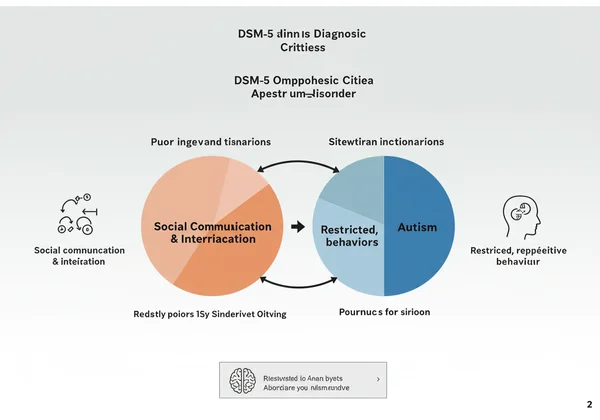Asperger's Test Results: Talk to Your Doctor for Diagnosis
October 8, 2025 | By Jasper Finch
Receiving the results from an online aspergers test can be a pivotal moment, stirring a mix of validation, curiosity, and perhaps some uncertainty. You've taken a significant step toward self-understanding, and now you might be wondering, what are the symptoms of undiagnosed Asperger's in adults that I should consider next? This guide helps you navigate your results and empower you to take the next, most important step: talking to a healthcare professional.
Your journey of self-discovery is unique and valuable. An online screening is a fantastic starting point, offering insights that can illuminate your personal experiences. If you're ready to explore your traits more deeply, you can always start your journey on our platform.
Understanding Your Online Asperger's Test Results
After completing a test, the first step is to interpret the results within the proper context. It's crucial to understand what an online screening tool can and cannot do. This clarity helps manage expectations and guides your next actions effectively.
Understanding Your Score: What Our Online Asperger's Test Means (And Doesn't Mean)
Think of your score from our online Asperger's test as a preliminary indicator, not a definitive conclusion. Our tool, based on scientifically validated scales like the AQ and RAADS-R, is designed to identify traits commonly associated with the autism spectrum. A higher score suggests that you share many of these characteristics and that further exploration with a qualified professional is a logical and recommended next step.
However, it is not a medical diagnosis. A formal diagnosis can only be made by a qualified clinician, such as a psychologist or psychiatrist, after a comprehensive evaluation. Our test is a powerful, private, and insightful screening tool to help you begin that conversation.
The Emotional Journey: Validation, Relief, or Confusion
It's completely normal to feel a wide range of emotions. For many, seeing their lifelong experiences reflected in the results brings a profound sense of validation and relief—a feeling of "I'm not alone" or "this finally makes sense." For others, it can bring up feelings of confusion or anxiety about what it all means. Whatever you are feeling, acknowledge it. This emotional response is part of the process of understanding your unique neurotype.

Preparing for a Professional Asperger's Diagnosis
Moving from an online screening to a clinical assessment requires preparation. Gathering your thoughts and documenting your experiences will make your conversation with a doctor more focused and productive. This groundwork is a crucial part of advocating for your own health and well-being.
Identifying Key Asperger's Traits to Discuss with Your Doctor
Before your appointment, take time to reflect on specific traits and experiences throughout your life. A formal diagnosis often involves examining developmental history. Consider these areas:
- Social Communication: Think about challenges in understanding social cues, navigating small talk, or interpreting non-literal language like sarcasm.
- Repetitive Behaviors & Special Interests: Document any intense, focused interests you've had. Note any routines, rituals, or repetitive movements that bring you comfort.
- Sensory Sensitivities: Reflect on your experiences with sounds, lights, textures, or smells. Are you easily overwhelmed or, conversely, do you seek out intense sensory input?
Documenting Your Experiences: A Personal History Checklist
Creating a written log can be incredibly helpful. You don't need to write a novel; bullet points are perfect. Try to recall examples from different stages of your life—childhood, school years, and adulthood. Include anecdotes that illustrate your points. If you used our platform, the detailed AI-powered report can be an excellent resource to bring with you, providing a structured overview of your traits. You can always get your AI report to help organize your thoughts.

How to Talk to Your Doctor About Autism Concerns
Initiating a conversation about a potential autism diagnosis can feel daunting. Being prepared can reduce anxiety and ensure you convey your concerns clearly and effectively. Your goal is to open a dialogue and collaborate with your doctor on the next steps.
Crafting Your Narrative: A "Script" for Your Doctor's Visit
You don't need to memorize a speech, but having a few opening lines can help break the ice. You could start with something direct and clear, such as:
- "I'm here today because I've been exploring the possibility that I might be on the autism spectrum. I took a well-regarded online screening, like the aspergers test online, and the results indicated I have many associated traits."
- "For a long time, I've struggled with [mention 1-2 key challenges, e.g., social situations or sensory overload], and my research has led me to consider Asperger's/autism. I'd like to discuss getting a formal assessment."
Bring your notes and be ready to share the specific examples you documented.
Advocating for Yourself: What to Do If Your Doctor is Unfamiliar
While awareness is growing, not all general practitioners are experts in adult autism, especially in how it can present differently in women. If your doctor seems dismissive or unfamiliar with the topic, stay calm and be persistent. You can say, "I understand this is a specialized area. Could you please provide me with a referral to a psychologist or clinic that specializes in adult autism assessments?" Remember, self-advocacy is a powerful tool.

Navigating the Adult Autism Assessment Process
Once you have a referral, you'll begin the formal assessment process. Knowing what to expect can demystify the experience and help you feel more in control of your journey. This is where the clinical experts take over to provide a definitive answer.
Finding a Qualified Specialist for Adult Asperger's/Autism
The key is to find a clinician with specific experience in diagnosing adults on the autism spectrum. A general therapist may not have the necessary expertise. Look for clinical psychologists, neuropsychologists, or psychiatrists who list adult autism or neurodevelopmental assessments as a specialty. Online directories from national autism organizations are often a great place to start your search.
Understanding the Diagnostic Criteria: What Clinicians Look For (DSM-5)
Clinicians in many parts of the world use the Diagnostic and Statistical Manual of Mental Disorders (DSM-5) to diagnose autism spectrum disorder (ASD). Asperger's syndrome is now included under the umbrella of ASD. The criteria primarily focus on two core areas:
- Persistent deficits in social communication and social interaction.
- Restricted, repetitive patterns of behavior, interests, or activities.
The assessor will gather this information through interviews, questionnaires, and sometimes observational assessments to see if your lifelong pattern of experiences meets the clinical threshold for a diagnosis.

Your Journey Continues: Empowered Steps Towards Self-Understanding
Taking an online Asperger's test is a brave and proactive step on a longer journey of self-discovery. Your results are not an endpoint but a signpost, pointing you toward a deeper understanding of yourself. By preparing thoughtfully and advocating for your needs, you can confidently engage with medical professionals to get the clarity you deserve.
This journey is about empowerment—gaining the language and understanding to frame your experiences, harness your strengths, and navigate your challenges. To continue exploring your unique traits, we invite you to use the resources on our platform.
Frequently Asked Questions After Your Asperger's Test
Can an online Asperger's test provide a formal diagnosis?
No, an online test is a screening tool, not a diagnostic instrument. It can accurately identify traits associated with Asperger's/autism and suggest if a professional evaluation is warranted. A formal diagnosis must be conducted by a qualified healthcare professional through a comprehensive assessment.
How do I get professionally tested for Asperger's syndrome as an adult?
The first step is to speak with your primary care physician. Discuss your concerns and the results from your online screening. Your doctor can then provide a referral to a specialist, such as a psychologist or psychiatrist, who is experienced in diagnosing autism in adults.
What are common symptoms of undiagnosed Asperger's in adults I should discuss with my doctor?
Common themes to discuss include lifelong difficulties with social intuition and communication, intense and highly focused interests, a strong need for routine, and sensory sensitivities (to light, sound, or touch). Providing specific life examples is much more helpful than just listing symptoms. You can discover your results on our platform to help identify these themes.
Are there positive traits of Asperger's that doctors look for?
While diagnostic criteria focus on challenges, a good clinician will also recognize the strengths associated with this neurotype. These can include strong logical and analytical skills, an exceptional ability to focus (hyperfocus), honesty, loyalty, and a unique perspective. Highlighting your strengths is an important part of a balanced assessment.